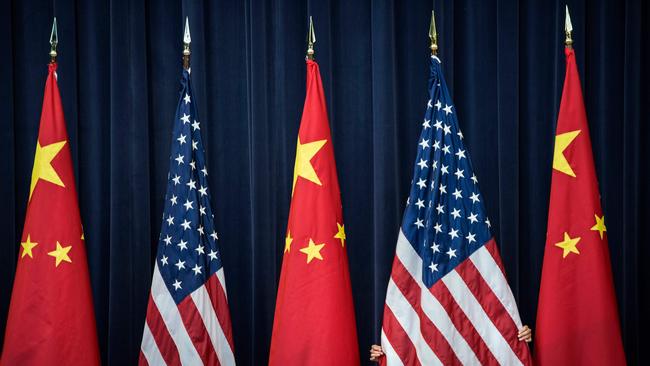Will China’s economy surpass the US’s? Some now doubt it
Slowing growth has dampened expectations that the Chinese economy will be the world’s largest by the end of the decade.

The sharp slowdown in China’s growth in the past year is prompting many experts to reconsider when China will surpass the US as the world’s largest economy — or even if it ever will.
Until recently, many economists assumed China’s gross domestic product measured in US dollars would surpass that of America . by the end of the decade, capping what many consider to be the most extraordinary economic ascent ever.
But the outlook for China’s economy has darkened this year, as Beijing-led policies — including its zero tolerance for Covid-19 and efforts to rein in real-estate speculation — have sapped growth. As economists pare back their forecasts for 2022, they have become more worried about China’s longer term prospects, with unfavourable demographics and high debt levels potentially weighing on any rebound.
In one of the most recent revisions, the Centre for Economics and Business Research, a UK think tank, thinks China will overtake the US as the world’s biggest economy two years later than it previously expected when it last made a forecast in 2020. It now thinks it will happen in 2030.
The Japan Centre for Economic Research in Tokyo has said it thinks the passing of the baton won’t happen until 2033, four years later than its previous forecast.
Other economists question whether China will ever claim the top spot. Former US Treasury Secretary Lawrence Summers said China’s ageing population and Beijing’s increasing tendency to intervene in corporate affairs, along with other challenges, have led him to substantially lower his expectations for Chinese growth.
He sees parallels between forecasts of China’s rise and earlier prognostications that Japan or Russia would overtake the US — predictions that look ridiculous today, he said.
“I think there is a real possibility that something similar would happen with respect to China,” said Professor Summers, now at Harvard University.
Researchers debate how meaningful GDP rankings are, and question whether much will change if China does overtake the U.S. The depth and openness of the American economy mean the US will still have outsize influence. The dollar is expected to remain the world’s reserve currency for years to come.
Size alone doesn’t reflect the quality of growth, said Leland Miller, chief executive officer of China Beige Book, a research firm. Living standards in the US, measured by per capita gross domestic product, are five times greater than in China, and the gap is unlikely to close soon.
Still, a change in the ranking would be a propaganda win for Beijing as it seeks to show the world — and its own population — that China’s state-led model is superior to Western liberal democracy, and that the US is declining both politically and economically. Over time, it could lead to more-substantive changes as more countries reorient their economies to serve Chinese markets.
“If China slows down substantially in its growth, it impacts China’s capacity to project power,” said Professor Summers.
How the two countries stack up economically matters to Chinese leaders: After the US economy grew faster than China’s during the last quarter of 2021, Chinese President Xi Jinping told officials to ensure the country’s growth outpaces America’s this year, the Journal previously reported.
Economic fortunes can reverse quickly. In 2020, when China bounced back faster than the US did from initial Covid-19 outbreaks, it looked like China’s economy might surpass America’s sooner than expected.
Some economists appear less perturbed by near-term threats to China’s growth. Justin Yifu Lin, a former chief economist at the World Bank who has long been bullish on China’s potential, argues its larger population means the country’s economy will wind up twice as big as the US’s eventually. At a forum in Beijing in May, he predicted that process would continue despite the country’s latest slowdown.
Nevertheless, economic problems keep piling up in China, in part because of policy choices Beijing has made to contain Covid-19 and rein in debt.
The country’s real-estate slowdown is showing no signs of letting up. An index tracking consumer confidence plunged to its lowest level in decades in spring this year. Urban youth unemployment is at a record high.
The Lowy Institute, an Australian think tank, noted in a March report that it expects Chinese growth to average only about 2 per cent to 3 per cent a year between 2021 and 2050, compared with some researchers’ expectations that China could maintain 4 per cent to 5 per cent growth until midcentury. The institute cited unfavourable demographics, diminishing returns from infrastructure investments and other challenges.
With growth of 2 per cent to 3 per cent a year, China could still become the world’s largest economy, the institute noted.
“But it would never establish a meaningful lead over the United States and would remain far less prosperous and productive per person than America, even by mid-century,” it wrote. Its growth also wouldn’t be enough to give it any significant competitive advantage.
In a response to questions, the Lowy Institute said China’s further economic slowdown since the report came out has “at minimum pushed back the likely moment when China might overtake the US, and made it more likely that China might in fact never be able to do so.” Measured by purchasing power, which takes into account differing costs of goods and services across countries, China already overtook America’s economy in 2016, according to World Bank figures.
Measured in US dollar terms, however, China’s GDP was 77 per cent of the size of America’s. in 2021, up from 13 per cent in 2001, data from the World Bank shows.
Capital Economics researchers wrote in a report early last year that their most likely scenario envisions China’s economy expanding to about 87 per cent of the size of the US’s in 2030, before dropping back to 81 per cent in 2050. It blamed China’s shrinking working population and weak productivity growth, among other factors.
“A lot of people for a long time have over-estimated the competence of China’s leadership and have been shocked by the missteps with Covid and the property sector,” wrote Mark Williams, the firm’s chief Asia economist, in an email in which he reaffirmed his firm’s forecast. “The weakness these crises have revealed have been present and growing for a long time.”
Some researchers say China’s ability to overtake the US will depend on whether it pursues more economic policy changes.
Bert Hofman, director of the East Asian Institute at the National University of Singapore and a former economist at the World Bank, said he believes China can surpass the US in GDP size by 2035, if it raises its retirement age, allows more rural workers to move to cities, and takes steps to enhance productivity such as spending more on education and healthcare.
But China won’t be able to catch the US if policy makers pursue only “limited reforms,” he said, or if it suffers a debt crisis. Further decoupling with the US could make it harder for China to advance, as the flow of knowledge from abroad is disrupted, he said.
Other economists worry that size comparisons risk eliciting nationalism that can be detrimental to both countries.
“Too many people have lost sight of the fact that our economies are mutually beneficial,” said Andy Rothman, an investment strategist at Matthews Asia. Since China joined the World Trade Organisation, he noted, US exports to China are up over 600 per cent, compared with 126 per cent to the rest of the world.
“Looking at the Chinese economy and the US economy as a zero-sum game — that’s not accurate,” he said.
The Wall Street Journal



To join the conversation, please log in. Don't have an account? Register
Join the conversation, you are commenting as Logout